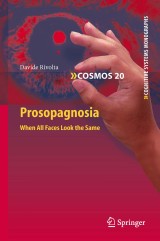Details

Prosopagnosia
When all faces look the sameCognitive Systems Monographs, Band 20
|
96,29 € |
|
| Verlag: | Springer |
| Format: | |
| Veröffentl.: | 24.09.2013 |
| ISBN/EAN: | 9783642407840 |
| Sprache: | englisch |
| Anzahl Seiten: | 95 |
Dieses eBook enthält ein Wasserzeichen.
Beschreibungen
<p>This book provides readers with a simplified and comprehensive account of the cognitive and neural bases of face perception in humans. Faces are ubiquitous in our environment and we rely on them during social interactions. The human face processing system allows us to extract information about the identity, gender, age, mood, race, attractiveness and approachability of other people in about a fraction of a second, just by glancing at their faces. By introducing readers to the most relevant research on face recognition, this book seeks to answer the questions: “Why are humans so fast at recognizing faces?”, “Why are humans so efficient at recognizing faces?”, “Do faces represent a particular category for the human visual system?”, What makes face perception in humans so special?, “Can our face recognition system fail”?. This book presents the author’s findings on face perception during his research studies on both normal subjects and subjects with prosopagnosia, a neurological disorder characterized by the inability to recognize faces. The book describes two known forms of prosopagnosia: acquired prosopagnosia, which is the result of a brain lesion, and congenital prosopagnosia, which refers to a lifelong, developmental impairment of face recognition. Written in a comprehensive and accessible style, this book addresses both experts (cognitive scientists, psychologists, neuroscientists and computer scientists) and the general public, and aims at raising awareness for a debilitating face recognition disorder, such as prosopagnosia, which is often ignored or misdiagnosed as autism, with serious consequences for the affected persons and their families.</p>
Cognitive Science: History, Techniques and Methodology.- Cognitive and neural aspects of face processing.- Prosopagnosia: The inability to recognize faces.- Can I recognize faces without knowing it? Evidence of covert face recognition in prosopagnosia.- Stories from people who share their lives with congenital prosopagnosia.
<p>This book provides readers with a simplified and comprehensive account of the cognitive and neural bases of face perception in humans. Faces are ubiquitous in our environment and we rely on them during social interactions. The human face processing system allows us to extract information about the identity, gender, age, mood, race, attractiveness and approachability of other people in about a fraction of a second, just by glancing at their faces. By introducing readers to the most relevant research on face recognition, this book seeks to answer the questions: “Why are humans so fast at recognizing faces?”, “Why are humans so efficient at recognizing faces?”, “Do faces represent a particular category for the human visual system?”, What makes face perception in humans so special?, “Can our face recognition system fail”? This book presents the author’s findings on face perception during his research studies on both normal subjects and subjects with prosopagnosia, a neurological disorder characterized by the inability to recognize faces. The book describes two known forms of prosopagnosia: acquired prosopagnosia, which is the result of a brain lesion, and congenital prosopagnosia, which refers to a lifelong, developmental impairment of face recognition. Written in a comprehensive and accessible style, this book addresses both experts (cognitive scientists, psychologists, neuroscientists and computer scientists) and the general public, and aims at raising awareness for a debilitating face recognition disorder, such as prosopagnosia, which is often ignored or misdiagnosed as autism, with serious consequences for the affected persons and their families.</p>
Compact yet comprehensive account of the cognitive and neural mechanisms of human face recognition Introduces the general readers to the most important neuroimaging techniques used to investigate the brain Describes the clinical and neural features of prosopagnosia, a neurological disorder characterized by the inability to recognize faces All the concepts are presented in an easy-to-understand style, making them also accessible to the general public Includes supplementary material: sn.pub/extras
Diese Produkte könnten Sie auch interessieren:

Alcohol Problems in Adolescents and Young Adults

von: D. Lagressa, G.M. Boyd, Marc Galanter, V.B. Faden, E. Witt

213,99 €

Development of Emotions and Emotion Regulation

von: Manfred Holodynski, Wolfgang Friedlmeier

96,29 €














